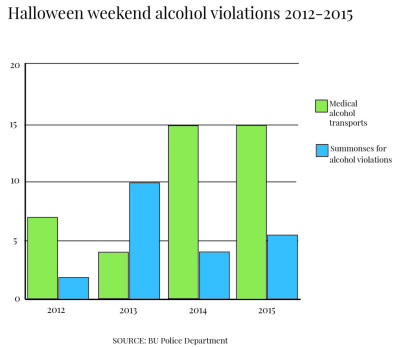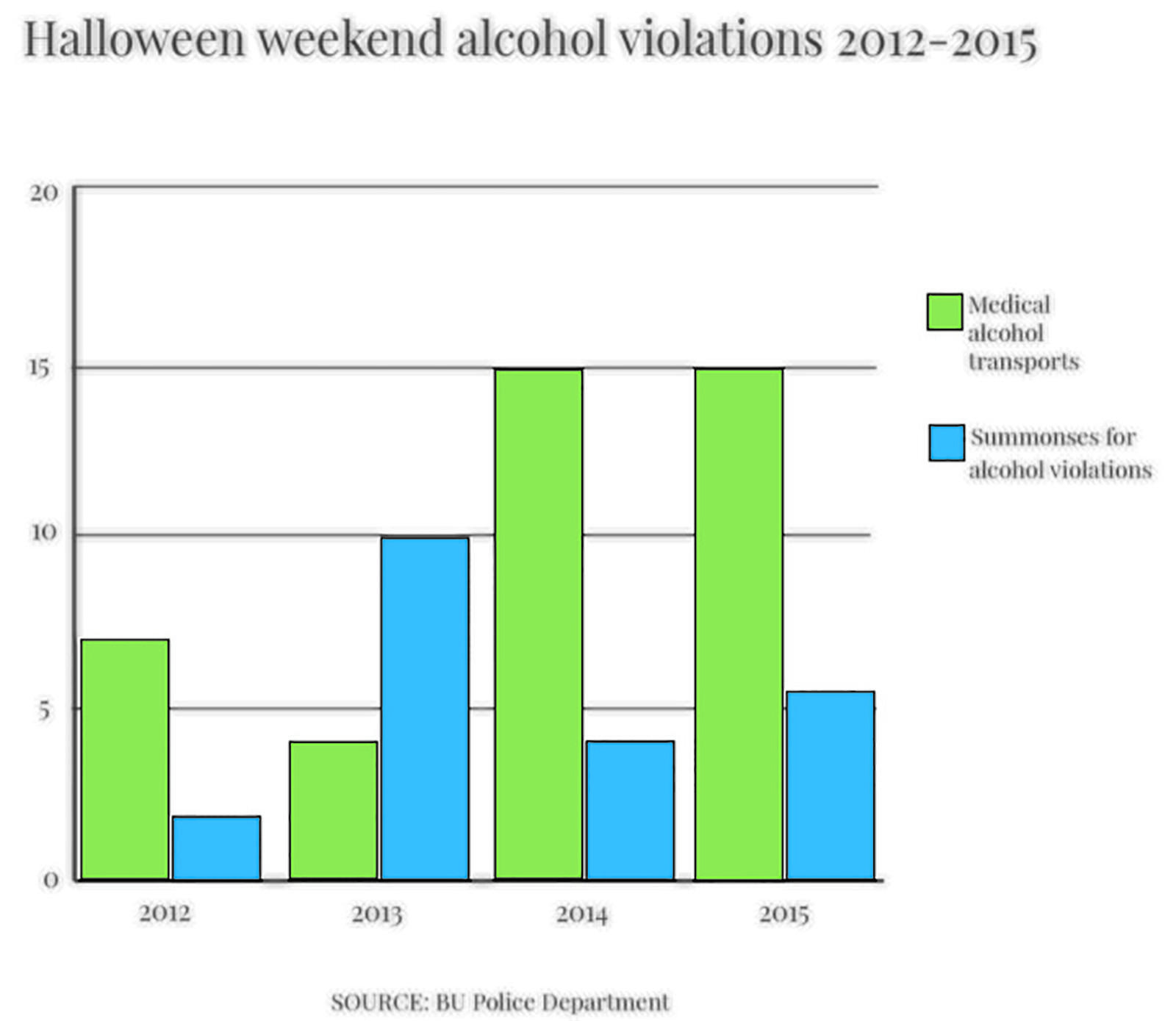 Boston University has experienced a rise in medical alcohol transports for students in the past two years during Halloween weekend as compared to previous years, according to the school’s alcohol enforcement numbers.
Boston University has experienced a rise in medical alcohol transports for students in the past two years during Halloween weekend as compared to previous years, according to the school’s alcohol enforcement numbers.
There were almost four times as many Halloween weekend transports to hospitals related to alcohol in 2015 and 2014 — 15 each year — compared to 2013, an analysis of past data revealed.
BU started to crack down on alcohol enforcement in 2011 when they increased enforcement and reported statistics weekly on different alcohol violations, the school announced in BU Today. This hike in enforcement was meant to decrease alcohol medical transports, which appeared to be effective for the first two years, as hospital transports decreased to six and four instances during Halloween weekend in 2012 and 2013, respectively. Transports, however, have now shown a spike in the past two years.
Scott Pare, deputy director of public safety for the BU Police Department, said in an email that the festive time of year for Halloween increases the party activity within the community, but BUPD prepared in order to prevent the dangerous alcohol-related behavior.
“BUPD increased its patrols [this year] to increase visibility and hired additional [Boston Police Department] patrols to assist in the areas surrounding our campus,” he said. “The university increased the number of available activities on campus to give the students many options to celebrate responsibly.”
David Rosenbloom, a professor of health and policy management with an expertise in alcohol and alcoholism, said the marketing of alcohol and the weather could be possible explanations for the rise in drinking in the past two years.
“Halloween has become one of the most heavily marketed and promoted days of the year for the alcohol industry so they are really pushing excessive drinking as the Halloween celebration,” he said. “I think that counter-marketing prior to the weekend can help, alternative activities that are not alcohol-based can help.”
Several students said they were very aware of the increase in partying and the level of severity that it took over Halloween weekend.
“It is kind of frightening though to see that that is happening more and more often now,” said Eli Saracino, a sophomore in the College of Arts and Sciences. “It is definitely something that should be looked into more.”
Saracino said the extent of the drinking that took place on Halloween weekend and the increase in binge drinking is possibly culture-related and unsettling.
“I know that a lot of Halloween weekend is all about the partying, so a lot of that in college these days is drinking and that could be more enveloped into our culture now,” he said. “ … If there was something to point at I would start by looking there, definitely if it is something almost considered fun and living on the edge to do these now dangerous things.”
Elise Roche, a sophomore in CAS, said she thinks drinking has become “trendy” for college students, which could be a possible explanation for the rise in alcohol transportations, but education about alcohol could help to bring the numbers back down.
“I think that in general educating people is important,” she said. “Keeping people informed about responsible ways to drink is definitely a helpful measure, because I feel like if students knew how to drink responsibly they would do a better job, because yeah it is illegal for a lot of students who are being transported to drink, but I think BU is aware that they are doing it and if people know what they are getting into it ends up better usually.”
Aidan Gordon, a freshman in the College of General Studies, said the reason for an increase in medical alcohol transports is because students don’t know their limits when it comes to alcohol, but there isn’t much BU can do about the problem.
“I see posters everywhere about alcohol awareness and I think that that is very obvious that the information is there if the students want to listen,” he said. “I think it is honestly just a matter of who students surround themselves with and what they choose to do and I don’t know I’m not sure if there is much the school can do.”
























































































































